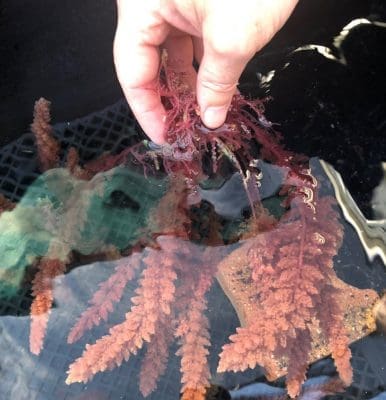THE feedlot industry is set to be the big early winner in beef’s new silver bullet – seaweed.
It’s ability to reduce cattle methane emissions to undetectable levels has the livestock industry buzzing, and was a frequent topic of discussion during seminars at Beef 2021 last week.

Compounds in red asparagopsis seaweed have been found to reduce methane emissions from livestock by at least 80 percent
But it is the improvement in feed efficiency at the same time as decreasing methane that will drive uptake according to Future Foods chief scientist Dr Rob Kinley.
The news is not quite as exciting for grassfed producers, with the need to feed seaweed supplements frequently making it less applicable in the early stages, at least.
Dr Kinley’s work, which began in Canada and then expanded to Australia, has shown feeding a specific variety of seaweed – asparagopsis – can decrease methane emissions to below detectable levels.
There could even be the possibility to make beef production carbon negative, the seminar audience was told.
Dr Kinley told the crowd at Beef 2021 that only a small portion of the diet – 0.5 percent of dry weight intake in a high grain ration or about 40-50 grams a day – can have this effect.
“Every bite the animal eats will have the seaweed product in it and it will be a very consistent effect throughout the day, and day after day,” Dr Kinley said.
“At the same time, we get an improvement in the feed conversion efficiency, so can get more product for the same amount of feed or the same amount of product for less feed.”
It also works in a grass-based diet, but the ability for cattle to access the additive at least every second day to gain the full effects is proving more difficult to navigate, at this stage.
“It is a lot easier in a total mixed ration environment like a feedlot, at this stage of development, where we are mixing the entire feed ration for the animal, including the seaweed supplement,” he said.
However research would look to develop next-generation products that could be placed in the paddock – either loose licks or blocks – to administer to paddock cattle.
“We don’t have the technology now to get into those larger paddocks, but we will look at various techniques to do it,” he told the Beef 2021 audience.
“(But) all supplements have the same issue when it comes to getting into those animals.”
What Future Foods is now trying to tackle is the production challenge behind the predicted burgeoning demand for seaweed supplements.
If all of Australia’s one million cattle on feed were given the supplement, thousands of tonnes would be needed every year.
Research is now looking at the possibility of pulse feeding, or even day-on, day-off feeding of seaweed, which would reduce the volume needed by half, to determine the effect on emissions and feed efficiency.
“We will be looking at using wild harvest as the smaller side of our supply chain and that’s what we are using right now because it is all we can really get,” Dr Kinley said.
Future supplies look likely to come from a mix of land-based seaweed farming and ocean-based farming with the production from those farmed systems being tested on cattle.
Dr Kinley said the cost of the seaweed supplement should decrease as production ramped up.
“Initially it will be more than what it will be in the very short term, as the technology gets up there,” he said.
“I can assure you we will be able to keep it within its returns both on feed efficiency but also as the carbon credit system develops – it will pay for itself in pretty short order.”
Dr Kinley said while emissions reductions were important, it would be the improvements in feed efficiency which would largely drive uptake.
“Whatever we do, we want to maintain feed conversion efficiency (though feeding seaweed) because that in the end is what provides the relative draw in adoption to the product,” he said.
“It is what is most valuable to the industry at least economically but environmentally, clearly emissions reduction is absolutely massive.”
The work on seaweed was a collaboration between CSIRO, Meat and Livestock Australia and James Cook University.
